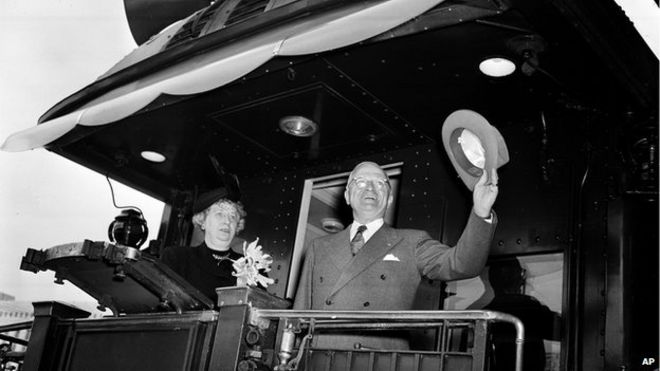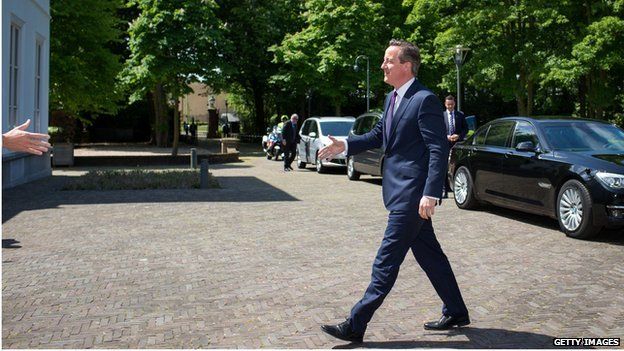The Vocabularist: Have we got the meaning of 'whistle-stop' right?
- 4 hours ago

Many journalists dubbed David Cameron's lightning round of visits to European leaders last week a "whistle-stop tour". How close is that to the original meaning, and does it matter?
In 1928 OO McIntyre, in his column New York Day By Day, wrote of someone having to admit that their home town is "some outlandish whistle stop with the conventional red depot".
So, a whistle stop was an undistinguished American town. Beyond that the precise meaning is unclear.
It may have been one of those halts where the train wouldn't stop unless you requested it to - but that was usually called a "flag stop" in America.
The "red depot" suggests a smartly painted, perhaps a brick-built station, not a couple of tin shacks amid the tumbleweed.
And where did the whistle come in? Some explanations say the train would whistle to alert the station, so that a signal could be raised. Others claim the driver would sound the whistle to acknowledge a stop request.
In both cases, the system would probably work just as well without the whistle.
Perhaps the phrase simply evokes the sound of the approaching train, heralding a fleeting link between a lonely town and the outside world.

Railway stations were an obvious place for political meetings in America, from the time of Abraham Lincoln on. In big, spread-out communities they provided a gathering point.
And American trains with a balcony at the back (confusingly called a "platform") had a raised place to make a speech from and pass quickly on.
Harry Truman made the classic rail speaking tour in 1948 to secure his return to the White House. Associated Press reporter Jack Bell wrote: "Smiling, President Truman headed toward Michigan today on the first lap of a whistle stop campaign in which he will criss-cross the nation."
Truman travelled 30,000 miles in his train car Magellan, from which he sometimes made 15 speeches in a day. And a new political phrase was born.
How appropriate is this phrase to describe the Cameron tour of Europe? To liken meetings at remote country depots to talks with EU leaders in their own capitals may seem ludicrous (though the "whistle-stops" where Truman spoke in fact included many large cities).
And closed-door bargaining with fellow politicians is different from public speeches, whether delivered to a huge crowd or a little town gathering.
But "whistle-stop" does covey the idea of quick in-and-out visits succinctly. And we can hardly expect a metaphor to preserve all its original meaning, or else it would be of little use - would not be a metaphor, in fact.
Imagine if you could never say you wouldn't touch something with a barge pole unless you really meant a barge pole.

The Vocabularist

Subscribe to the BBC News Magazine's email newsletter to get articles sent to your inbox.
Latest Tweets
From BBC News Magazine@BBCNewsMagazine
The pain of throwing away something which is worth a life-changing amount of moneyhttp://t.co/oaTDZA2bQUhttp://t.co/LILAUTzGO2
11 hours ago
RT @BBCMonitoring: Chinese children given 'wealth education' at luxury villa http://t.co/yGWQnmSTbB#NewsfromElsewherehttp://t.co/1ID1FxQ6…
12 hours ago
The musicians refusing to dance to IS's tune http://t.co/zb0eV0s7lRhttp://t.co/0PyujG04KQ
12 hours ago
Content from Twitter. Learn more.
ADVERTISEMENT FEATURE PRESENTED BY
Boundless Adventure
Journey on 6 road trips through Quebec

No comments:
Post a Comment
Please leave a comment-- or suggestions, particularly of topics and places you'd like to see covered